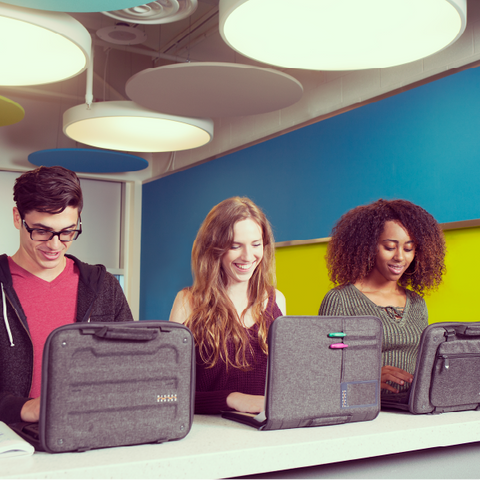Why Students Should Be Allowed to Use Laptops in Class

Laptops serve as valuable learning tools for students, but some educational institutions and instructors discourage or even prohibit their use. The primary argument against allowing these computers is that they distract students during lectures.
One concern is that if students have access to the web, they will spend more time surfing, shopping online or checking their Facebook or Instagram pages. Some instructors also believe that students learn and retain information more effectively when taking handwritten notes instead of typing them.
However, the benefits of using laptops in class can far outweigh any drawbacks. With both students and teachers taking advantage of the internet and various technology, they can experience a better collaborative learning environment.
10 Benefits of Laptop Use

Using laptops in the classroom does provide numerous benefits, especially for today's students who have grown up in the Information Age.
1. Meet Today's Needs
Since most kids today were exposed to mobile devices starting at an early age, computers have become a central part of their lives. Students rely on them for just about everything, and not allowing students to use a laptop in the classroom could place them at a disadvantage. Some students may not function and learn as well without the ability to look things up or take notes without a computer.
2. Access to Supporting Facts
One advantage of having a web-connected laptop in the classroom is immediate access to relevant information. For example, a student can perform a quick Google search on a topic the instructor is covering and use the information to contribute to the discussion. This input can also benefit others in the class.
3. Increased Engagement
Attention spans can be short in today's fast-paced world. The ability to look up additional information can help students stay engaged during a lecture. A point made by the instructor can often pique interest and make students want to learn more about the topic. Computers can also help students quickly clarify a fact or area of confusion without interrupting the instructor to ask a question.
4. Enhanced Organizational Skills
As many students grow up with laptops, tablets and other mobile devices, they are already proficient at using all the devices' features. They understand how to create computer files, significantly reducing the need for paper notebooks, documents and folders. The lack of paper makes it easier for students to stay organized, leading to a more efficient learning experience. Other organizational benefits include scheduling, tracking assignments and accessing the school calendar online.
5. Fewer Copying Errors
Curricula such as engineering or mathematics make extensive use of complex figures, formulas and equations. In a traditional classroom environment, students must write these by hand. Their unfamiliarity with these symbols can easily lead to transcription mistakes. Instructors can help alleviate this issue by supplying copies before class that students can access with their laptops during the lecture. Then, students will spend less time writing and copying and more time paying attention to the presentation.
6. Better Than Writing
Since students are adept at using laptops and likely developed excellent typing skills at an early age, they can use laptops more efficiently than writing by hand. Many kids type more quickly than they write, which proves invaluable when taking notes in the classroom. Laptops also eliminate legibility issues — students do not have to make cross-outs or try to read hurried, indecipherable scribblings.
7. Access to Software
Laptops can enable students to use software programs that serve as valuable classroom aids. Examples include active learning tools, such as video clips and PowerPoint presentations, and statistical analysis programs.
8. Improved Collaboration
Laptops allow students to collaborate with their classmates inside and outside the classroom. They can ask questions, compare notes and share what they have learned more readily. They can also work together on group projects even if they are not in the same location. There is no need to waste time traveling to the library, a nearby coffee shop or someone's home.
9. More Efficient Review Process
Mobile computers allow instructors to review student-submitted papers and assignments and provide feedback digitally. The instructors can go into more detail and provide more direction than when handwriting the information, which ultimately enhances their students' educational process.
10. Environmentally Friendly
Traditionally, instructors and students have relied heavily on paper for everything from notebooks and handouts to folders and textbooks. Using laptops to replace these items can substantially reduce paper consumption in an educational setting. The effort to go paperless saves trees and minimizes the use of destructive processes to harvest and process them, helping to protect the environment.
Contact Higher Ground to Learn More
Higher Ground offers an assortment of high-quality cases that protect laptops from drops and other damage. Request a quote today and receive additional information regarding the use of mobile computers in the classroom.
 Click To Call
Click To Call


Mark Zadvinskis
Author